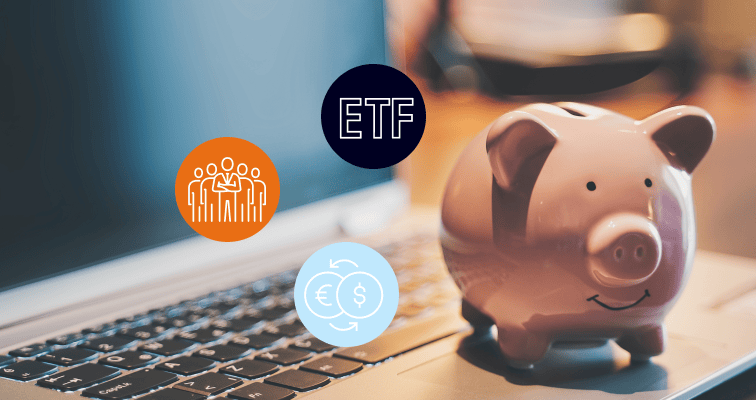Institutional and retail investors are the two main types of investors, and the primary drivers of the economy. While institutional investors are the giants of the financial industry, tasked with investing other people’s money, retail investors are individuals using their own money to invest for the sake of their own personal financial goals.
The fast-paced financial industry sees trillions of dollars move around the globe. These vast, daily movements of money are a primary driver of the overall economy, affecting the fortunes of individuals, companies and countries. But who are the driving forces behind this mass movement of capital?
There are two main types of investor: institutional and retail.
What are institutional investors?
Fundamentally, institutional investors are the organisations of experts who control vast sums of capital, and use their expertise to make strategic investments on behalf of others.
If you have a pension plan, any kind of insurance, or invest in an index or mutual fund, then you have already benefitted from the expertise of institutional investors.

Institutional investors are the movers and shakers in the financial markets, responsible for more than 85% of all activity on major indices such as the New York Stock Exchange.
When you consider news developments within the financial markets, you are nearly always looking at the behaviours of institutional investors, since they have a vastly larger impact on the markets overall than retail (“individual”) investors do.
On rare occasions, exceptions to this rule exist, such as the GameStop short squeeze of 2021 and the rise of the cryptocurrency Bitcoin. Both events have been driven, to a large extent, by retail investors.
Types of institutional investors
Let’s consider some examples of institutional investors, to better illustrate what they are and why they matter.
Exchange-Traded Funds (ETFs)
An ETF is an investment product, typically managed by different types of institutional investors, that tracks the performance of particular assets, industry sectors or indices.
Tip: ETFs offer exposure to many investments at once, offering easy diversification.
Mutual Funds
Mutual funds are investment products that are funded entirely by shareholders.
An active mutual fund seeks to outperform a particular financial index, investing to make a profit, while an index mutual fund seeks to replicate the performance of a particular financial index, investing based on certain criteria.
Index Funds
Index funds seek to track the performance of particular stock indices, such as the NASDAQ or the S&P 500. Their value grows as the stock market grows, meaning that although the returns are modest, they nearly always appreciate over time.
Renowned investor Warren Buffett is one of the best-known proponents of index funds, which he describes as the “safest haven” for institutional and retail investors alike.
Hedge Funds
A hedge fund is a professionally managed investment fund that trades in a variety of liquid assets on behalf of investors. Hedge funds use complex trading methods and risk management strategies to grow, including short selling and derivatives.
Pension Funds
Pension funds are the pooled funds that pay out an individual’s pension during retirement. They are important, as most of the population will interact with them.
Tip: Throughout your working life, your pension fund will be professionally managed by expert fund managers, who strategically invest contributions in order to grow the pension pool.
Insurance Companies
Insurance companies are among the largest, institutional players in the financial markets. They invest customer premiums in a wide range of assets (mainly in bonds) to increase revenues.
Commercial Banks
Generally, commercial banks are institutional investors. Banks invest money from customer deposits and shareholders to diversify and grow their holdings, shifting the wealth onto balance sheet assets.
What are retail investors?
Retail investors are “individual” investors, as opposed to those who are part of an institution.
Consider a retail investor as anyone who buys stocks, commodities, real estate, bonds, or any other type of asset with their own money, investing for the sake of their own financial goals.

Since they do not have direct market access, a retail investor must nearly always rely on some kind of middleman, such as a brokerage service or a wealth manager.
Although retail investors do not comprise as big a share of the overall market as institutional investors, they still have an important role to play in the overall economy. Let’s consider some examples of retail investors, to better understand their importance in the wider market.
Types of retail investor
Retail investors are those who act as an individual, rather than as part of an institution.
Stock Traders
Individuals can trade or invest in stocks by using an intermediary, such as a brokerage or exchange platform, to facilitate the market transaction. Most retail investors use platforms that allow them to purchase stocks or CFDs in order to capitalise on price trends.
Retail investors have an important role to play in the stock market, and can often influence price trends by sheer force of numbers.
Bond Buyers
Retail investors are actively encouraged to buy bonds, particularly government-backed bonds, either through a qualified brokerage platform or directly through government-affiliated services.
When an investor purchases government bonds, they are essentially loaning the government money for a fixed period of time, in return for interest paid. With the right broker, retail investors can also invest in corporate bonds.
Crypto Traders
Crypto trading is becoming increasingly popular among retail investors. It involves the buying, selling, and speculating of cryptocurrencies such as Bitcoin (BTC) or Ethereum (ETH).
Cryptoassets are digital currencies that operate on decentralised ledger technology called a blockchain, that facilitates highly secure peer-to-peer transactions.
Institutional vs retail investors
Let us recap the key differences between institutional and retail investors.
| Institutional Investors | Retail Investors |
|---|---|
| Invest and trade very large volumes of capital (often billions of dollars) very frequently, to increase wealth and profits on an organisational level. | Invest and trade small amounts of own capital, less frequently, to meet personal financial goals. |
| Have a significant impact on the direction of the market. | Individually, have a minor impact on the overall direction of the market. |
| Offered very low brokerage and commission fees due to their outsized role in the market. | Typically charged higher fees and commissions per trade. |
| Have access to all information on the market. Highly knowledgeable, with large teams of qualified financial experts making decisions. | Have access to a more limited range of retail-only data. Dependent on individual knowledge and resources to make investment decisions. |
| Activity is highly regulated and supervised by authorities. | Regulations and legislation exist mostly to protect retail investors themselves. |
Impact of institutional and retail investors
Institutional investors are important, mainly due to the sheer scale of the capital they command. Given that institutional investors can purchase in such large quantities, they uniquely and significantly dictate price movement in markets.
It is for this reason that retail investors often seek to follow the actions of institutional investors to learn more about the market, or even copy their trades outright.
By tracking the market and investing where the institutional investors are putting their money, many retail investors can construct a resilient and profitable trading strategy. There are other resources available for retail investors to explore the moves being made by institutional investors, such as Companies House data.
Conversely, there are many benefits to being a retail investor, with one of the most significant being flexibility. Retail investors are not tied to their portfolio or investment strategy, with agreements that lock them to a particular course of action. They can react with more flexibility to changing market conditions, or liquidate their portfolio with speed, for example. Retail investors have the utmost control over their own investment decisions and have the freedom to choose their own long-term focus.

Final thoughts
There is no escaping the fact that institutional investors play a dominant role in market activity and influence price trends with their activities. Retail investors have less individual impact on the wider market, but can invest in just about any asset by using brokerage services.
The extent to which a retail investor chooses to engage with institutions is dependent on their own trading strategy. Routine activity, such as participation in a pension plan or mutual fund, makes an investor a beneficiary of institutional investors, while strategies such as copy trading allow retail investors to follow the activities of institutions more actively.
Explore the eToro Academy to learn more about investing.
FAQs
- What should my investment goals be?
-
Setting investment goals can provide clarity to your investment strategy, enabling you to determine a plan and stick to it. You can start considering the type of investor you are, and your appetite for risk.
Setting SMART goals provides benefits, of which “having £30,000 in my investment account in 8 years to buy a boat” is one example. Your investment goals may also change over time, so there’s nothing wrong with revisiting and adapting them from time to time.
- What influence can institutional investors have in today’s business world?
-
Institutional investors contribute to economic growth by adding to the stock of capital. They provide big funds to companies, and due to their big share of companies, they may ensure that a company is performing ethically and with responsibility. They have the power to move markets.
- How can retail investors minimise their losses?
-
Often, retail investors lose money because they have invested their own capital in an asset that depreciates in value. To avoid this, it is important to set up a clear investment strategy based on one’s financial situation and goals, factoring in risk management and considered analysis.
This information is for educational purposes only and should not be taken as investment advice, personal recommendation, or an offer of, or solicitation to, buy or sell any financial instruments.
This material has been prepared without regard to any particular investment objectives or financial situation and has not been prepared in accordance with the legal and regulatory requirements to promote independent research. Not all of the financial instruments and services referred to are offered by eToro and any references to past performance of a financial instrument, index, or a packaged investment product are not, and should not be taken as, a reliable indicator of future results.
eToro makes no representation and assumes no liability as to the accuracy or completeness of the content of this guide. Make sure you understand the risks involved in trading before committing any capital. Never risk more than you are prepared to lose.


